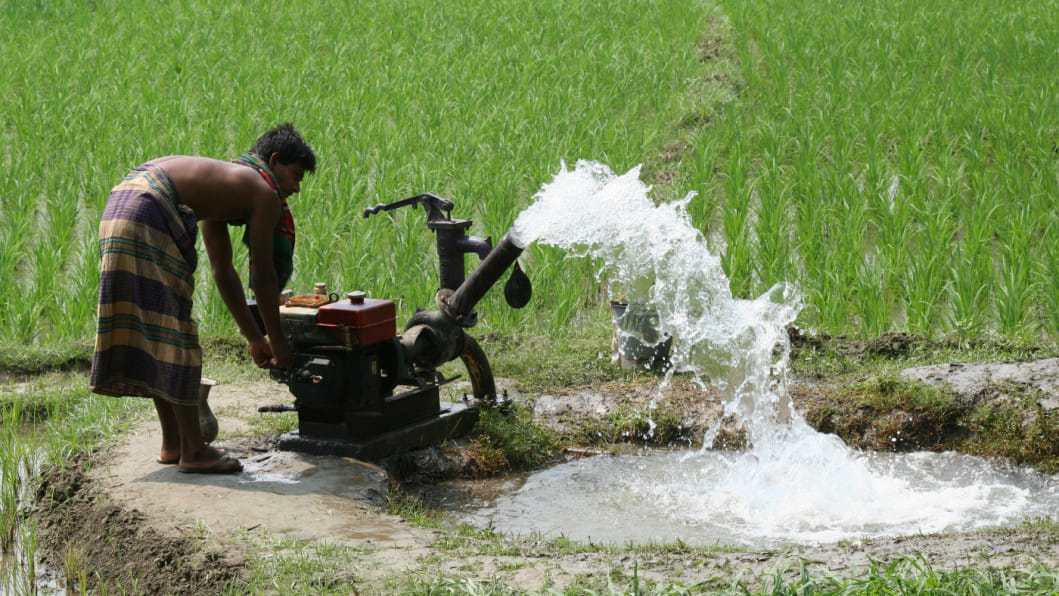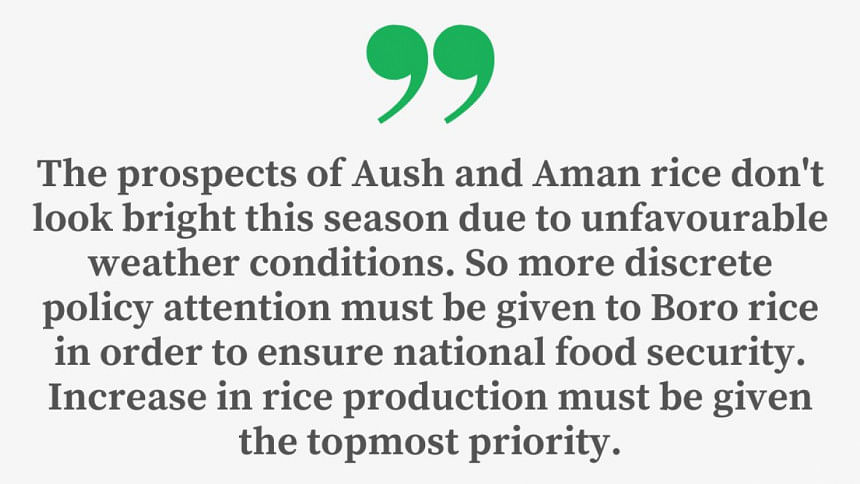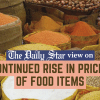Increased cost of irrigation: What about food security in Bangladesh?

The purpose of this article is not to evaluate the rationale or timing and the rate of increase in fuel prices. The intention here is to draw the attention of Bangladesh's policy circle to the potential impact of increased irrigation costs on the country's farmers. This is due to the increased diesel price, which will have an impact on the ongoing Aman rice season and the upcoming Boro rice cultivation beginning in December. It also aims to draw attention to the possible way forward to address this issue in the context of uncertainties in the global food market.
Let's begin with shallow tube wells, which irrigate about two-thirds of the total irrigated area in Bangladesh. About 80 percent of 1.4 million shallow tube wells in the country are run by diesel, while the remaining 20 percent are operated by electricity, although some of them are supported by standby diesel engines in order to cope with frequent power cuts during the peak irrigation season in March and April. A shallow tube well engine usually burns about 300 litres of diesel for Boro irrigation, which may vary with the frequency of irrigation depending on pump command area, soil type and topography. With a hike of Tk 34 per litre of diesel, an average shallow pump will then incur an additional cost of Tk 10,200 for Boro irrigation only. So, a crude estimation shows that farmers would have to spend an additional Tk 1,300 crore in total for irrigation via shallow tube wells. Similarly, about 200,000 of low-lift pumps, which are used in some of the irrigated areas, would need another additional Tk 200 crore for surface water irrigation.
At the same time, the price of urea fertiliser has also been increased. One may note that farmers have to buy diesel and fertilisers at a higher rate at retail level than the government-fixed prices. Meanwhile, the rise in the prices of essential commodities has caused a sudden surge in the wages for agricultural labour. The raising of Aman seedlings was affected by early floods in many areas, and the seedlings are already being sold at higher prices than normal. All this means that, in addition to climate-induced uncertainties, farming is becoming more and more expensive and risky.
Agriculture this year has become more difficult to manage due to scanty rainfall resulting in a prolonged drought situation. The peak rainy season was supposed to be right now. But very little or no rain here and there has already caused delay in Aman paddy planting, and it is likely to interfere with the early planting of potato, another important food crop. Many farmers are helplessly using their groundwater pumps to flood lands for transplanting Aman seedlings. If this unusual delay in planting is followed by a continuation of drought in the coming months, Aman, the second largest rice crop in Bangladesh, is destined to be seriously affected.
Given this critical situation, farmers in Bangladesh are in real trouble – both financially and weather-wise. They have no other choice but to continue with production, because any shortfall in their production may have serious consequences for the food security of their families as well as the country. We believe that the government is well aware and concerned about the production implications of the diesel price hike. With a view to maintaining farmers' incentives to invest in rice production in such an abnormal situation, a number of ways out can be considered.

Firstly, in consideration of the additional cost of Aman and Boro irrigation indicated above, an emergency fund of Tk 2,000 crore or so can be created to support paddy farmers. This fund can then make provisions for reimbursement of Tk 10,000 to each of the operating shallow tube well owners. It should be possible for the Department of Agriculture Extension (DAE) to collect the list of genuine pump owners through their nationwide union level agriculture officers. The administrative process and the decision to this effect may involve some time. But if such a decision can be declared immediately, irrigation pump owners will get confidence, and I believe they will have the economic incentives to invest extra money to provide irrigation services for themselves as well as for those farmers buying water from them. But a condition must be imposed for such reimbursement of cost: pump owners must not claim an additional price for irrigation on the excuse of the rise in diesel price.
Secondly, 35,000 deep tube wells cover about one-fourth of groundwater irrigation, and most of these are run by electricity. The Bangladesh Rural Electrification Board (BREB) and Bangladesh Power Development Board (BPDB) can be instructed to supply electricity without increasing the tariff for operating irrigation pumps.
Thirdly, the government has to take appropriate measures so that our farmers continue to get good prices for their paddy harvest, as they have in the past few years. For this, the government's paddy procurement programme has to be enhanced so that paddy prices at harvest are kept at an incentive level. This requires collection and use of proper data for rice production and storage at the public and private levels, so that the government can make informed decisions with respect to the quantity and timing of rice import, if that's needed at all. It is very important that we don't suffer from our own confusion or mistakes about public information.
Fourthly, since energy prices are declining internationally, it would be wise to adjust the domestic price of diesel quickly – certainly before the onset of the next Boro season.
Finally, in order to reduce pressure on our diesel-run irrigation system, the government should expand solar-powered irrigation by removing any legal or procedural obstacles.
It should be reiterated that the prospects of Aush and Aman rice do not look bright this season due to unfavourable weather conditions. So more discrete policy attention must be given to Boro rice in order to ensure national food security. Increase in rice production must be given the topmost priority.
Dr MA Sattar Mandal is professor emeritus and former vice-chancellor of Bangladesh Agricultural University, former member of Bangladesh Planning Commission, and currently a member of the expert pool at the Ministry of Agriculture.

 For all latest news, follow The Daily Star's Google News channel.
For all latest news, follow The Daily Star's Google News channel. 









Comments